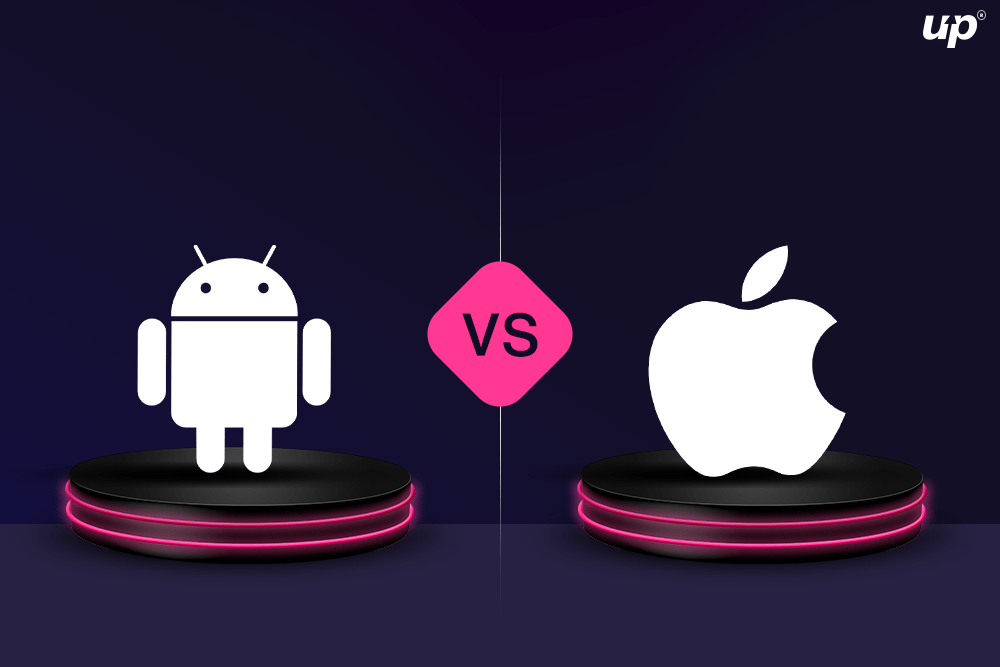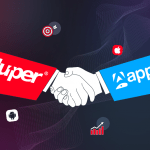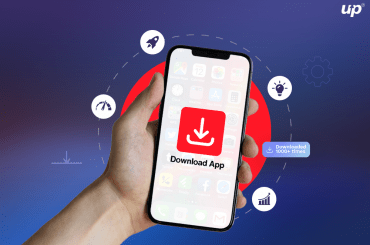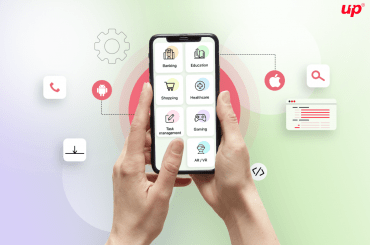A startup has more crucial decisions to make than an established business due to resource constraints and high stakes. Without an already existing customer base, a startup has more groundwork to do and hence, should enter the market with a product that is well-researched and presented to the potential audience.
While doing this, a startup might be confused about the suitable platform to enter the marketplace with. The two largest and most popular operating systems and app platforms are Android and iOS, and these are the two terms that usually haunt businesses, especially startups during their decision-making processes.
Thus, in this blog, we will discuss the two app development options in order to help startups make an informed decision.
But basics first!
What is Android App Development?
Launched back in 2003, Android is an open-source project based on the Linux kernel. In no time, it became the most popular mobile operating system globally. With over 2 Bn devices worldwide, and nearly 4 Mn published apps, Android, developed by Google, is one of the most sought-after app platforms in the world.
Android was developed specifically for touchscreen mobile devices like smartphones and tablets. Additionally, Android app developers use C, C++, Java, and Kotlin for app development and are proficient in these programming languages.
It is used by many major brands on their phones including HTC, Huawei, Lenovo, LG, Samsung, and Sony.
Benefits of Android App Development
There are multiple benefits of developing Android apps for startups. The advantages are as follows:
1. Flexibility: Android app development gives more flexibility to both users and developers. It offers more customization opportunities to users, in comparison to iOS apps. This is enabled through the open-source nature of this operating system. No single industry player or party restricts or controls new products or innovations, giving creative freedom for developing apps that capitalize on new and emerging technologies.
Further, it is used by multiple device manufacturers, allowing several hardware configurations and access to various apps. This offers developers more app development flexibility.
2. Global Market: Android’s global reach cannot be overstated. With around 2 billion Android devices being used worldwide, Android has penetrated even the nooks and crannies of the world. It caters to audiences belonging to different geographical locations, cultures, demographics, etc.
Therefore, for a startup especially, that might be targeting a general audience in different locations initially, Android’s user base could be greatly helpful.
3. Mature Ecosystem: Through Android app development, a startup could tap into the diverse ecosystem of Android-powered devices. Apps could be written for devices such as Wear OS, Android TV, and Chrome OS devices. This could boost user engagement, a necessary requirement for startups, with additional efforts of course.
4. Faster App Store Submission: It’s relatively easier to submit and publish an app on the Google Play Stores as it has less stringent approval rules and procedures.
Also Read About: https://www.fluper.com/blog/ready-to-increase-app-engagement-in-10-super-easy-steps/
Drawbacks of Android App Development
Android app development also comes with its share of cons or drawbacks. The following are its shortcomings:
- Fragmentation: A diverse ecosystem does help a business reach a wider audience. However, it also requires a lot of additional work to adjust the application to multiple screen sizes, resolutions, and aspect ratios.
- Security concerns: Android apps are often questioned and doubted for their security provisions. Since the Android app approval procedure is not difficult, the lack of strict procedures and protocols often makes these apps prone to cyber-attacks, malware practices, and anomalies.
- Longer development process and higher costs: The Android app development process is relatively longer and involves high costs. This is due to the wide range of devices, and sometimes the optimization of these apps costs a lot.
Further, running on various devices leads to multiple end devices from different smartphone manufacturers, and this makes the testing of Android apps difficult and a cost-intensive process.
What is IOS App Development?
It refers to the process of creating iOS apps for Apple hardware such as iPhone, iPad, and iPod Touch. iOS is a mobile operating system that was developed by Apple and is maintained by the tech giant.
Programming languages such as Swift or Objective-C are used to write the software. Afterward, the app is deployed to the App Store for users to view and download.
The Apple App Store is one of the most lucrative and widely used app platforms with over 2 billion apps for users to choose from.
Despite a rigorous testing and approval process for the Apple App Store, building an iOS app can be as easy as and, in some cases, even easier than developing an Android app.
Benefits of IOS App Development
- Revenue generation: Apple’s customer base is financially sound and customer spending, pretty generous. Apple users are utility-driven and do not mind paying for iOS apps. On the other hand, Android users are more frugal with their in-app purchases.
Thus, iOS app development is a more revenue-generating affair than Android app development.
- Secure apps: iOS apps are known for their security. Apple exercises complete control over its hardware and software, making iOS apps highly secure and reliable.
While the closed ecosystem has its drawbacks, there are lower chances of proprietary software code being compromised, setting higher standards in comparison to the open-source ecosystem.
Thus, they are perfect for startups seeking to set foot in the market and develop a customer base.
- Device count: The number of Apple devices is less which means faster development, quick and easy testing, and thus, less optimization requirements for multiple devices, unlike in Android app development. The Apple products are only powered by iOS, allowing developers to adjust the app for a limited and pre-determined number of screens and devices.
- Seamless UI and UX: Apple offers its users a visually and aesthetically pleasing user interface and a uniform user experience across all Apple devices. This facilitates higher user interaction and engagement with the iOS apps.
Apple’s designs that reflect clarity, simplicity, and minimalism, made better by consistent user experiences across all iOS devices, have been engaging users so much that Apple has become one of the world’s biggest brands.
All this helps a startup get a good start.
Drawbacks of IOS App Development
Despite its benefits, certain drawbacks come with iOS app development. Some key issues are:
- Limited customization: Apple does not allow a lot of customization, which is not a limitation of Android app development. The tech giant is strict with its sleek and uniform designs and thus, does not allow developers to tamper it.
Moreover, third-party integrations are difficult to add when needed.
- High publishing standards: Apple has a name and quality standards to live up to. Thus, the app publishing tests and approval procedures are taxing and time-consuming affairs. This also has a bright side as Apple, during its careful review process, makes the app fit for the public to view and use, leading to fewer public failures and non-acceptance.
Android vs. IOS App Development
While Android and iOS app development both have their benefits and shortcomings, let’s company look at the key differences between them along with some important factors that affect a startup’s decision.
Following are the differences between Android and iOS app development:
| Parameters/features | Android | iOS |
| Programming languages | Java or Kotlin
|
Swift or Objective-C
|
| Screen sizes | Wide variety of screen sizes, thus a greater number of interface designs and case-by-case programming for compatibility required
|
Standardized screen sizes for Apple devices such as iPhones and iPads
|
| Device fragmentation | Device fragmentation; multiple devices running different versions of the OS
|
Less/No device fragmentation |
| User demographics | All age groups but frugal spending habits
|
Younger and more affluent
|
| Complexity of development process | More complicated because Android apps need to be built in Java and there is a lot more device fragmentation | iOS apps only need to be built once and not for every different model and size of the device
|
| Features flexibility | Open-source platform; offers access to multiple features and more customization
|
Limited features and customization |
| Development Time and Cost | Slow development,
Average development cost is $10,000+
|
Faster development,
Lies between $15,000 – $20,000 |
| App Security | Less app security
|
More app security |
| Maintenance and updates | Fewer updates | More likely to be frequently updated
|
Having looked at the functional and non-functional differences between Android and iOS app development, we will now look at the points to consider while choosing between the two development options, followed by use cases for both.
Also Read About: https://www.fluper.com/blog/top-android-features-visible-in-latest-ios-version-17/
Considerations Before Deciding
A startup or any business seeking a mobile app should ask itself the following questions before making a decision.
The considerations are as follows:
- User base
- Target audience
- Revenue model – in-app purchases and/or premium subscription models
- Ease of design and development desired
- Frequency of app updates
- Development budget
Which One to Choose When?
Both the development options have their own pros, cons as well as suitability in different scenarios. Let’s look at these use cases.
- Choose Android app development when:
- You are seeking a wider audience reach;
- The project requires a high level of design customization and unique features;
- The app needs to be rolled out immediately
- iOS mobile app development is ideal when
- The target audience resides in wealthier locations/regions, such as Northern Europe, North and South America, or Australia;
- A premium monetization model has been chosen or/and in-app purchases are planned to be added;
- The design needs to be clean and sleek yet predictable
Conclusion
Android and iOS, both development processes have their pros and cons. Thus, it largely depends upon the startup’s project requirements, user base, target audience, etc., which development option is more suitable.
Here are some future and current numbers as well as technical and non-technical aspects, summarized, that might help a startup decide between the two:
1. Prospects: The App Store is expected to generate more revenue, a projected $161 billion with an annual growth rate of 13.7%, while Google Play is expected to earn a profit of $72 billion and witness an annual growth rate of 9% annual growth by 2026.
For downloads, the story is different. Google Play is expected to contribute 143 billion downloads, while the App Store will only give 38 billion by 2026.
2. Target audience: Android would be able to give you a global reach, while iOS would help you dominate the regions of North and South America as well as Australia, and northern Europe.
3. Budget and time for development: Although development costs and time majorly depend upon the project complexities and requirements.
However, roughly speaking, an Android project may take longer due to the operating system release cycles, Android fragmentation, and device-specific issues. And due to all the same reasons, it might also cost more than iOS app development.
4. After development and launch maintenance: Android apps are more likely to give rise to maintenance challenges due to multiple manufacturers.
The iOS ecosystem, on the other hand, is more consistent as the hardware and software are managed by the same, single party.
5. Features: Since Android is an open-source operating system, it offers granular customization capabilities. On the other hand, iOS demands a lot of additional time and effort to go beyond uniform design components/elements.
6. User engagement: Both the platforms, Android and Apple, offer an equal opportunity for meaningful user interaction. Further, both platforms allow businesses to leverage the average user hours spent feature in order to translate the app’s progress and value.
Thus, a startup could now decide with internal discussions, which platform it deems more suitable for its project. The best iOS app development company or Android development company would further help a startup make the most optimal choice.












